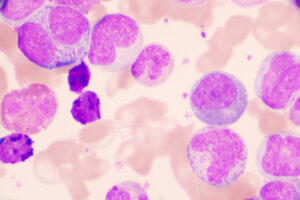Oncology
Chronic Lymphocytic Leukemia
The Role of Allogeneic Hematopoietic Stem Cell Transplantation in High-Risk Chronic Lymphocytic Leukemia
Overview
The role of allogeneic hematopoietic stem cell transplantation (allo-transplant) in patients with high-risk chronic lymphocytic leukemia (CLL) has diminished in recent years due to the availability of novel therapies that produce durable remission and are well tolerated. Dr William G. Wierda shares his thoughts on the future of cellular therapy for these patients.
Expert Commentary
William G. Wierda, MD, PhD
|
|
“ . . . today, it is uncommon for us to recommend allo-transplant for patients with high-risk relapsed/refractory CLL, although we do still consider it for individuals with Richter’s transformation because we know that those patients can have durable remissions with this modality.”
Historically, allo-transplant, a form of cellular therapy, was considered a treatment of choice for patients with relapsed high-risk CLL, such as those with 17p deletion or TP53 mutations, because it offers the potential for cure. However, allo-transplant has become more of a last resort in recent years for a couple of reasons: (1) most patients are older and therefore do not tolerate transplant as well and it can be difficult to find an acceptable donor and (2) there are a number of new and novel targeted therapies to achieve long-term disease control, even in the high-risk setting. Regarding new agents for the long-term management of CLL, we are working on developing synergistic combinations that improve activity and outcomes. Thus, today, it is uncommon for us to recommend allo-transplant for patients with high-risk relapsed/refractory CLL, although we do still consider it for individuals with Richter’s transformation because we know that those patients can have durable remissions with this modality.
Other cell-based therapeutic strategies are emerging as very promising for relapsed/refractory CLL, including high-risk disease, particularly the CD19 chimeric antigen receptor T-cell strategy. I believe that this strategy will overtake allo-transplant for patients who otherwise would have been considered for transplant. The ongoing phase 1/2 TRANSCEND CLL 004 study is evaluating the use of lisocabtagene maraleucel (also known as liso-cel) monotherapy, combined with the Bruton tyrosine kinase inhibitor ibrutinib or combined with venetoclax for patients with relapsed/refractory CLL or small lymphocytic lymphoma. We reported the initial safety and preliminary efficacy data at the 62nd American Society of Hematology Annual Meeting and Exposition and continue to update the results. In the latest update for the cohort of liso-cel combined with ibrutinib, 23 patients received this combination. More than half (59%) of the 22 evaluable patients in the study had a complete response, and, of the 22 individuals who were evaluable for minimal residual disease (MRD) in bone marrow, 19 (86%) achieved undetectable MRD status by next-generation sequencing and 86% of the 21 patients evaluable in blood via flow cytometry achieved undetectable MRD (both assays had a sensitivity of ≤10-4). These results suggest that chimeric antigen receptor T-cell therapy may be an effective treatment option for treatment-experienced adult patients with high-risk relapsed/refractory CLL, producing rapid and durable responses. It is a strategy that is better tolerated by older patients than transplant and therefore, in my opinion, offers more potential over stem cell transplantation. With more experience, we will likely see optimization of this treatment and evaluation in earlier lines of treatment.
References
Farina L, Barretta F, Scarfò L, et al. Refractory and 17p-deleted chronic lymphocytic leukemia: improving survival with pathway inhibitors and allogeneic stem cell transplantation. Biol Blood Marrow Transplant. 2020;26(10):e256-e262. doi:10.1016/j.bbmt.2020.06.032
Gauthier J, Hirayama AV, Purushe J, et al. Feasibility and efficacy of CD19-targeted CAR T cells with concurrent ibrutinib for CLL after ibrutinib failure. Blood. 2020;135(19):1650-1660. doi:10.1182/blood.2019002936
Gribben JG. How and when I do allogeneic transplant in CLL. Blood. 2018;132(1):31-39. doi:10.1182/blood-2018-01-785998
Kim HT, Shaughnessy CJ, Rai SC, et al. Allogeneic hematopoietic cell transplantation after prior targeted therapy for high-risk chronic lymphocytic leukemia. Blood Adv. 2020;4(17):4113-4123. doi:10.1182/bloodadvances.2020002184
Siddiqi T, Soumerai JD, Dorritie KA, et al. Updated follow-up of patients with relapsed/refractory chronic lymphocytic leukemia/small lymphocytic lymphoma treated with lisocabtagene maraleucel in the phase 1 monotherapy cohort of TRANSCEND CLL 004, including high-risk and ibrutinib-treated patients. Blood. 2020;136(suppl 1):40-41. doi:10.1182/blood-2020-140491
Wierda WG, Dorritie KA, Munoz J, et al. TRANSCEND CLL 004: phase 1 cohort of lisocabtagene maraleucel (liso-cel) in combination with ibrutinib for patients with relapsed/refractory (R/R) chronic lymphocytic leukemia/small lymphocytic lymphoma (CLL/SLL) [abstract 544]. Abstract presented at: 62nd American Society of Hematology Annual Meeting and Exposition; December 5-8, 2020.











